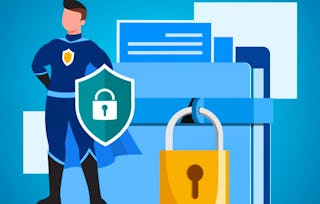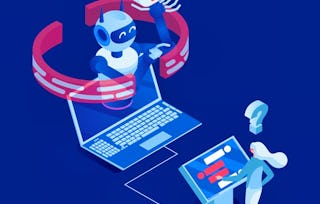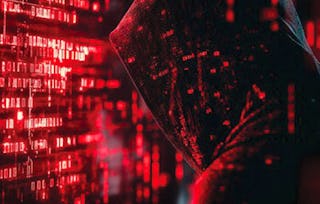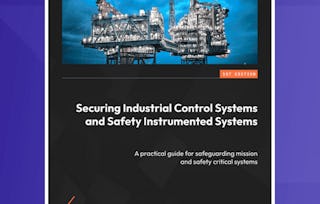The course "Artificial Intelligence Industrial Control Systems Security" explores the intersection of artificial intelligence (AI) and industrial control systems (ICS) security, focusing on the safety, trust, and privacy of AI technologies within critical infrastructures. Learners will gain a comprehensive understanding of the key cybersecurity challenges faced by ICS and the role AI can play in mitigating these risks. Through the exploration of large language models (LLMs), regulatory frameworks, and advanced ICS protocols, students will learn how to implement robust security measures for AI systems and industrial control environments.
即将结束: 只需 199 美元(原价 399 美元)即可通过 Coursera Plus 学习新技能。立即节省

Artificial Intelligence Industrial Control Systems Security
本课程是 Information Assurance Analysis 专项课程 的一部分

位教师:Jason Crossland
包含在 中
您将学到什么
Learn how to assess and address safety, privacy, and security concerns in AI systems and their impact on cybersecurity.
Understand the legal and policy frameworks surrounding AI technologies and their application in industrial settings.
Gain expertise in securing industrial control systems (ICS), including PLC, SCADA, and DCS, and mitigating their vulnerabilities.
Explore advanced ICS security strategies, focusing on risk assessment, incident response, and securing OT protocols and supply chains.
您将获得的技能
要了解的详细信息

添加到您的领英档案
12 项作业
了解顶级公司的员工如何掌握热门技能

积累特定领域的专业知识
- 向行业专家学习新概念
- 获得对主题或工具的基础理解
- 通过实践项目培养工作相关技能
- 获得可共享的职业证书

该课程共有5个模块
This course provides a comprehensive exploration of the safety, cybersecurity, and privacy implications of AI systems and large language models (LLMs). Students will evaluate the accountability of AI under the law and investigate governance frameworks. The course also focuses on the security challenges specific to Operational Technology (OT) and Industrial Control Systems (ICS), highlighting key vulnerabilities and operational differences from IT. Practical skills in using tools like Wireshark for cybersecurity analysis and implementing protective measures for PLCs will be emphasized. Through discussions and hands-on activities, learners will gain a robust understanding of the complex interplay between technology, security, and regulatory requirements.
涵盖的内容
1个视频2篇阅读材料
This module explores the safety and cybersecurity aspects of AI systems, focusing on evaluating their security, privacy, and autonomous concerns. It also covers the applicability and functionality of large language models (LLMs), including how algorithms and learning patterns enhance their performance.
涵盖的内容
5篇阅读材料3个作业6个插件
This module explores the legal accountability of AI systems, examining how they are regulated and governed. It covers human factors in computing systems and the policies that AI systems fall under. Students will assess how ChatGPT contributes to or detracts from value and analyze the impact of chatbots on large language models (LLMs).
涵盖的内容
3篇阅读材料3个作业4个插件
This course explores the Purdue Enterprise Reference Architecture Model and Unified Facilities Criteria, providing a framework for industrial control systems (ICS). It covers basic control systems like PLC, SCADA, and DCS, and examines the operational differences between IT and OT environments. Students will learn about key cybersecurity control elements to enhance ICS security, identify top vulnerabilities from a cyber perspective, and understand the usage and implementation of PLC application firewalls and software whitelisting.
涵盖的内容
4篇阅读材料3个作业3个插件
In this module, we will continue our discussion of Industrial Control System (ICS) networks. Specifically discussing what encompasses supply chain risks, Original Equipment Manufacturers/Vendors, and techniques for mitigating these risks. We will also discuss and examine several different types of ICS/OT protocols regarding their characteristics, purposes/implementations, the cybersecurity concerns with various OT proprietary and open protocols, and the differences between OT and IT environments.
涵盖的内容
3篇阅读材料3个作业4个插件
获得职业证书
将此证书添加到您的 LinkedIn 个人资料、简历或履历中。在社交媒体和绩效考核中分享。
位教师

从 Security 浏览更多内容
 状态:预览
状态:预览Edureka
 状态:免费试用
状态:免费试用Johns Hopkins University
 状态:免费试用
状态:免费试用Macquarie University
人们为什么选择 Coursera 来帮助自己实现职业发展




常见问题
To access the course materials, assignments and to earn a Certificate, you will need to purchase the Certificate experience when you enroll in a course. You can try a Free Trial instead, or apply for Financial Aid. The course may offer 'Full Course, No Certificate' instead. This option lets you see all course materials, submit required assessments, and get a final grade. This also means that you will not be able to purchase a Certificate experience.
When you enroll in the course, you get access to all of the courses in the Specialization, and you earn a certificate when you complete the work. Your electronic Certificate will be added to your Accomplishments page - from there, you can print your Certificate or add it to your LinkedIn profile.
Yes. In select learning programs, you can apply for financial aid or a scholarship if you can’t afford the enrollment fee. If fin aid or scholarship is available for your learning program selection, you’ll find a link to apply on the description page.
更多问题
提供助学金,







